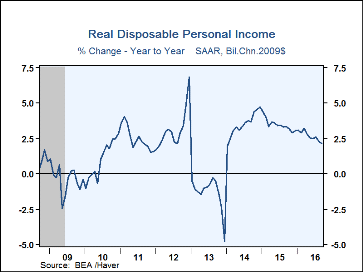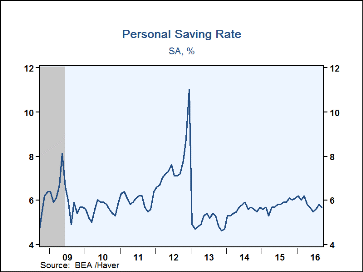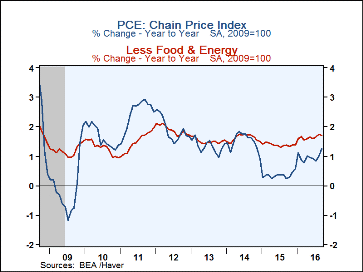 Global| Oct 31 2016
Global| Oct 31 2016U.S. Personal Spending Rebounds Along With Income
by:Tom Moeller
|in:Economy in Brief
Summary
Consumer spending recovered last month following a brief pullback. Personal consumption expenditures increased 0.5% (3.7% y/y) after a 0.1% dip during August. The gain matched expectations in the Action Economics Forecast Survey. [...]
Consumer spending recovered last month following a brief pullback. Personal consumption expenditures increased 0.5% (3.7% y/y) after a 0.1% dip during August. The gain matched expectations in the Action Economics Forecast Survey.
Adjusted for higher prices, spending rose 0.3% (2.4% y/y) after a 0.2% decline. A 1.8% rebound in real durable goods spending led last month's rise as motor vehicle purchases recovered 3.5% (3.4% y/y) after a 4.7% drop. Recreational product & vehicle outlays jumped 1.5% (9.6% y/y) after a 0.5% fall. Home furnishings & appliance spending gained 0.7% (6.5% y/y) on the heels of two straight declines. Nondurable goods purchases eased 0.1% (+1.5% y/y) despite a 0.5% rise (0.9% y/y) in clothing purchases. Real services outlays improved 0.1% (2.2% y/y) for the third straight month. A 1.2% rebound (3.5% y/y) in restaurant & accommodations spending (3.5% y/y) led the gain after a 0.2% dip. A 1.1% rise (0.2% y/y) in recreation services outlays followed after a 1.6% decline. Housing & utilities outlays declined 0.6% (+0.9% y/y) following a 0.4% increase.
Personal income posted a 0.3% increase (3.2% y/y) following a 0.2% rise. A 0.4% increase had been expected. Disposable personal income increased 0.3% (3.4% y/y) after a 0.2% rise, while adjusted for higher prices, take home pay improved 0.1% (2.1% y/y).
Wages & salaries rose 0.3% (3.8% y/y) following a 0.1% uptick. Proprietors' income jumped 0.6% (2.0% y/y), as did rental income (5.9% y/y). Receipts on assets improved 0.2% (0.2% y/y) after a 0.5% rise, while transfer receipts gained 0.1% (3.5% y/y). That reflected a third consecutive 0.3% rise in Medicare payments (5.3% y/y). Social Security payments receipts increased 0.2% (3.0% y/y), as they did in August. Unemployment insurance benefits declined 3.6% (-8.2% y/y) with the improved job market.
The personal savings rate eased to 5.7% from 5.8%, and it remained below the high of 6.2% in March. The level of personal savings eased 0.1% y/y.
The chain price index increased 0.2% (1.2% y/y) for a second straight month, while excluding food & energy prices notched 0.1% higher (1.7% y/y) after a 0.2% rise. A 5.1% increase (-6.3% y/y) in gasoline prices led the index higher. Clothing prices offset the rise with a 0.5% decline, and they were off 0.5% y/y as well. The durable goods price index moved 0.5% lower (-2.6% y/y), down for the seventh month this year. A 0.9% decline in recreational goods prices (-5.7% y/y) paced the fall. The services price index increased 0.2% (2.4% y/y) as it has in all but two months this year. Food prices eased 0.1% (-1.7% y/y), also down for the seventh month this year.
The personal income & consumption figures are available in Haver's USECON database with detail in the USNA database. The Action Economics figure is in the AS1REPNA database. Further detail is in USNA.
| Personal Income & Outlays (%) | Sep | Aug | Jul | Sep Y/Y | 2015 | 2014 | 2013 |
|---|---|---|---|---|---|---|---|
| Personal Consumption Expenditures | 0.5 | -0.1 | 0.3 | 3.7 | 3.5 | 4.4 | 2.8 |
| Personal Income | 0.3 | 0.2 | 0.4 | 3.2 | 4.4 | 5.2 | 1.1 |
| Wages & Salaries | 0.3 | 0.1 | 0.5 | 3.8 | 5.1 | 5.1 | 2.7 |
| Disposable Personal Income | 0.3 | 0.2 | 0.4 | 3.4 | 3.8 | 5.1 | -0.1 |
| Personal Saving Rate | 5.7 | 5.8 | 5.6 | 5.9 (Sep. '15) |
5.8 | 5.6 | 5.0 |
| PCE Chain Price Index | 0.2 | 0.2 | 0.0 | 1.2 | 0.3 | 1.5 | 1.3 |
| Less Food & Energy | 0.1 | 0.2 | 0.1 | 1.7 | 1.4 | 1.6 | 1.5 |
| Real Personal Consumption Expenditures | 0.3 | -0.2 | 0.3 | 2.4 | 3.2 | 2.9 | 1.5 |
| Real Disposable Income | 0.1 | 0.0 | 0.3 | 2.1 | 3.5 | 3.5 | -1.4 |
Tom Moeller
AuthorMore in Author Profile »Prior to joining Haver Analytics in 2000, Mr. Moeller worked as the Economist at Chancellor Capital Management from 1985 to 1999. There, he developed comprehensive economic forecasts and interpreted economic data for equity and fixed income portfolio managers. Also at Chancellor, Mr. Moeller worked as an equity analyst and was responsible for researching and rating companies in the economically sensitive automobile and housing industries for investment in Chancellor’s equity portfolio. Prior to joining Chancellor, Mr. Moeller was an Economist at Citibank from 1979 to 1984. He also analyzed pricing behavior in the metals industry for the Council on Wage and Price Stability in Washington, D.C. In 1999, Mr. Moeller received the award for most accurate forecast from the Forecasters' Club of New York. From 1990 to 1992 he was President of the New York Association for Business Economists. Mr. Moeller earned an M.B.A. in Finance from Fordham University, where he graduated in 1987. He holds a Bachelor of Arts in Economics from George Washington University.
More Economy in Brief
 Global| Feb 05 2026
Global| Feb 05 2026Charts of the Week: Balanced Policy, Resilient Data and AI Narratives
by:Andrew Cates










